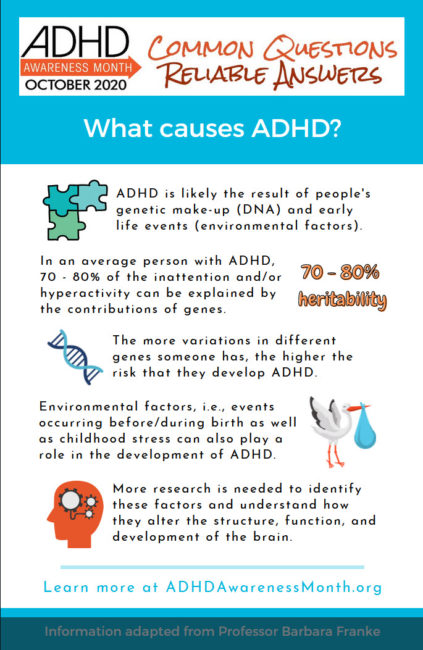In most people having the diagnosis, ADHD is likely to be the result of their genetic make-up (i.e. their DNA) and events that happen to them throughout (early) life (which we call environmental factors).
ADHD has a high heritability of around 70-80%. What this means is that in an average person with ADHD, 70-80% of the inattention and/or hyperactivity can be explained by contributions of genes. Sometimes I hear people talk about ‘having the ADHD gene’. This is not correct: the average person with ADHD probably has tens to hundreds small variations in different genes. The more of those gene variants a person has, the higher their risk to develop ADHD.
While 70-80% heritability sounds like a lot, genetic factors are certainly not the only factors that are important in developing ADHD. Also environmental factors, in particular events occurring before or during birth, but also stress during childhood, play an important role. Thus, not everybody with a high load of gene variants will actually go on to develop ADHD.
In most cases, a combination of many gene variants and environmental factors is likely involved. There are probably many environmental factors involved in ADHD, which we do not yet know. In addition to those that increase risk for ADHD, there may be also factors that reduce the risk.
The genetic factors (together with environmental factors) involved in ADHD are thought to alter brain development very early in life, probably starting already before birth. However, much research is still needed to
- identify all the specific factors involved (e.g., we expect that variants in more than 1000 genes are involved, and we need to get more insight into the environmental factors that increase and reduce ADHD risk) and
- to understand, how these factors alter the structure, function, and development of the brain.
About the Author

Barbara Franke is a Professor of Molecular Psychiatry at the Radboud University Medical Center in Nijmegen, The Netherlands. She studies the genetic factors involved in psychiatric disorders, especially ADHD, and investigates the biological pathways that lead from variants in genes to alterations in the brain and to symptoms.
Read more:
About genetic studies in ADHD and heritability:
Faraone SV, Larsson H. Genetics of attention deficit hyperactivity disorder. Mol Psychiatry. 2019 Apr;24(4):562-575. doi: 10.1038/s41380-018-0070-0. Epub 2018 Jun 11. PMID: 29892054; PMCID: PMC6477889. https://www.nature.com/articles/s41380-018-0070-0
About the factors that contribute to ADHD:
Larsson, H. et al. Genetic and environmental influences on adult attention deficit hyperactivity disorder symptoms: a large Swedish population- based study of twins. Psychol. Med. 43, 197–207 (2013).
https://bit.ly/3laz7Yi
About ADHD across the lifespan:
Franke B, Michelini G, Asherson P, Banaschewski T, Bilbow A, Buitelaar JK, Cormand B, Faraone SV, Ginsberg Y, Haavik J, Kuntsi J, Larsson H, Lesch KP, Ramos-Quiroga JA, Réthelyi JM, Ribases M, Reif A. Live fast, die young? A review on the developmental trajectories of ADHD. https://www.ncbi.nlm.nih.gov/pmc/articles/PMC6379245/

